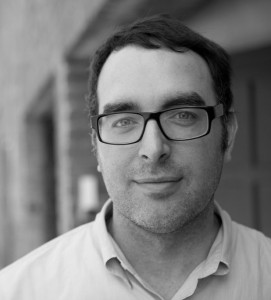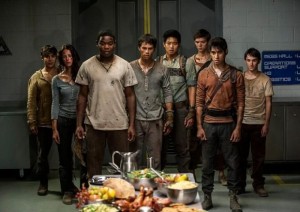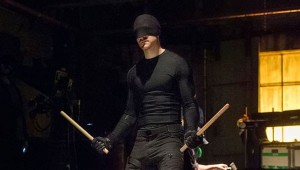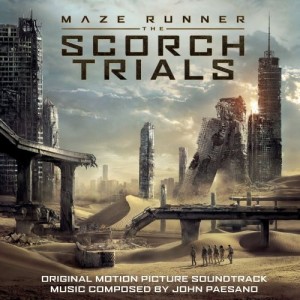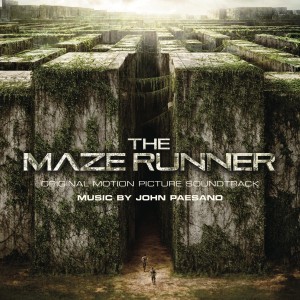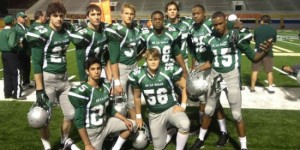From INSURGENT to THE HUNGER GAMES, the YA (i.e. Young Adult) sci-fi genre is all the rage when it comes to kids revolting against the evil, adult dystopian powers that be. And while all might have their share of tragedy and mayhem delivered upon its protagonists in their search for sanctuary, none have delivered the kind of epic mayhem better reserved for outright teen-unfriendly horror pictures with the expansive eye and ear-catching ferocity of THE MAZE RUNNER and its sequel THE SCORCH TRIALS.
It seems like only yesterday (or at least last September) that Fox’s franchise, spun from James Dashner’s novels (and prequels), got off to an impressive start as young Thomas (Dylan O’Brien) got thrown via freight elevator into a Kafkian / Lord of the Flies nightmare he never made. Filled with body-crushing, ever-changing Godzilla-sized mazes, Thomas and his compatriots ran like hell while battling their own tribal insanity. Powering their desperate attempts to outwit “The Glade” was an impressive mix of breathless, dark electric percussion and frightening, towering orchestrations that certainly made an impression – created by a musical talent that seemingly came from nowhere along with Thomas Like him, THE MAZE RUNNER was a literal breakout for composer John Paesano. A stalwart of VOD productions like S.W.A.T. FIREFIGHT, SUPERMAN / BATMAN: APOCALYPSE and ANOTHER CINDERELLA STORY, Paesano had long been waiting for his chance to make a run to the next Hollywood level, and succeeded beyond his hopes with a MAZE-smashing success, its music meeting rock-grinding effects head on thanks to the astute ear of graphic designer-turned filmmaker Wes Ball for his debut feature.
But if Ball and Paesano’s collaboration on THE MAZE RUNNER captured the suffocating weight of what it was like to be trapped in a hellish Rubik’s cube, then their even more impressive sequel THE SCORCH TRIALS eally opens up Thomas’ world, and then some. Now released into a sand-filled seemingly unending desert Thomas and his few surviving friends from the Maze must navigate at top speed through raving zombies, city ruins and the avarice of the Mengele-like WCKD organization that blindly, and ruthlessly sees the kids’ lives as a means to a beneficent end. Taking on a true sense of stirringly melodic, exciting danger that was once suppressed by giant building blocks, Paesano unleashes a savage and terrifically exciting score that embodies a danger-filled world, while opening up new labyrinths of emotion for its characters to meet, many of whom meet ghastly fates in the process. Paesano isn’t so much scoring a “YA” picture here as much as he is an all-audience one, displaying an adventurous, apocalyptic vigor that his one-time collaborator Jerry Goldsmith would approve of – with the only element this SCORCH acks being horse-riding apes.
THE MAZE RUNNER has also revealed new courses for Paesano’s musical imagination, most popularly the super-heroic sense of “Daredevil.” For this beyond-gritty take for Netflix’s Hell’s Kitchen corner of the Marvel Universe, Paesano stripped down a traditional superhero score to its most minimally powerful essentials, building the bing-watching suspense of the blind crusader’s final costumed confrontation with the Kingpin. Far warmer, and traditionally emotional are his stirring sports scores for the football games of WHEN THE GAME STANDS TALL and the forthcoming, MY ALL-AMERICAN, which kicks off with a battling optimism that RUDY would appreciate. And in more child-friendly realms, Paesano continues to ride high with his Annie-winning score for DRAGONS, the TV-spin on HOW TO TRAIN YOUR DRAGON.
Now firmly in the spotlight with a future that can’t stop running on rapidly maturing feet, Paesano talks about navigating an even more complex, and texturally richer musical sequel to “THE MAZE RUNNER.
ASSIGNMENT X: Could you tell us about your own film scoring journey?
JOHN PAESANO: I have wanted to be a film composer as far back as I can remember. It really hit me about the age of 10 after seeing Steven Spielberg’s EMPIRE OF THE SUN. I was so drawn to that film, and of course to John Williams’ amazing score. There was just something very magical about that film, which sounds strange considering the content of the story. The movie centers on a young English boy who struggles to survive after being separated from his parents during the Japanese occupation of Shanghai during World War II. The main character in that film, Jim Graham (young Christian Bale), had a fantastic imagination, and had uncanny ability to always find adventure in whatever task or circumstance he was put too or up against. I was so amazed how John Williams was able to use his music to show the viewer how a 10-year-old boy would view the events of that war versus how an adult would, and how the music functioned in that film – how integral it was in order to help the viewer see this story unfold through Jim’s eyes. The score really grabbed me and I remember having a conversation with myself saying, “that’s what I want to try to do when I get older!”… And I stress the word TRY. So private music lessons started around the age of 12-13 (Piano), music school after formal school (Berklee College Of Music), and then out to Los Angeles to start the long road to become a film composer. So it was a very premeditated music journey, it was never about anything else besides scoring film. People always say, “Oh you are in the music business”, and always have to correct them and say, “Actually, I consider myself more a part of the film business”
AX: Some of your own notable early scores were on direct-to-video sequels like ANOTHER CINDERELLA STORY, S.W.A.T. FIREFIGHT as well as the animated movies of SUPERMAN / BATMAN: APOCALYPSE and BEN 10: SECRET OF THE OMNIMATRIX. How do you think these projects developed your action and dramatic abilities for bigger theatrical pictures?
PAESANO: It’s a very interesting business, not just music, but the entertainment industry as a whole. There are so many levels that we operate on. I will give you a short example. Lets take a film like SUPERMAN / BATMAN: APOCALYPSE. The job required around 75 minutes of orchestral hybrid score, I think I had about four weeks to score the entire film. It was a package deal and the budget didn’t allow for any live players, no orchestrators, no contractor, no programmers, no music editor. Now lets compare that to a big Hollywood action film. Let’s, for argument sake, say it needs 75 minutes of music of orchestral hybrid score, usually not a package. Production has money for an orchestra, orchestrators, contractor, music editor(s), programmers, ambient music designers, scoring mixer, music mixer, etc…
What I’m getting at is 75 minutes of music is 75 minutes of music.
Working on direct to DVD films can be much more challenging than some studio features, just for the sheer fact that more times than not you have to do EVERYTHING yourself. You become your own music editor, you are you own orchestrator, do all your programming, sometimes you even have to mix and deliver your own score to the dub. Not to mention, there is just as much politics to navigate, and the expectations are still the same as they are on studio features, just a lot less money to get to the finish line!! I feel you learn a lot on direct-to-DVD and small budget films, possibly more than you will ever learn on big Hollywood productions. That’s why I think they are so important to the development of a young composer coming up in the biz. If you can get through a direct-to-DVD project you can get through anything!!
AX: How did you come aboard your first Hollywood breakout film with THE MAZE RUNNER?
PAESANO: I was already familiar with director Wes Ball’s work from his short film RUIN, which I thought was absolutely fantastic! When I found out that he took on the directing gig for THE MAZE RUNNER. I worked with my agents to find a way to get some music in front of Wes. I have a great relationship with Fox Music that goes back almost 10 years. Over that time period I had done a bunch miscellaneous projects for them and we were all just waiting for the right opportunity to present itself to graduate to the next level. So when both those worlds collided I was able to get into the mix for THE MAZE RUNNER gig. Fox Music got some of my music in front of Wes. He listened, and came to the studio for a meeting. We had a great conversation and got along really well. We both grew up on the same type of films (Steven Spielberg, James Cameron, and Ridley Scott). Wes is also a HUGE film score enthusiast. All he listens to are film scores, so that was another thing we had in common. So we geeked out on all of this stuff, I played him some cues, he told me his thoughts about the movie, and really just hung out for an hour or two. A couple of months later I got hired for the gig.
A lot of young composers don’t realize that there is so much more to this job than just writing music. At this level, everybody is extremely talented, everybody knows how to write music, and these days there are so many different styles of film music. The range is extremely broad. Fox Music does a fantastic job at pairing directors with composers, not just on a musical level, but on a personal level as well. I think they truly understand how important that aspect of the job is, and they just don’t make it about the music when they suggest composers to directors and producers. It’s about the whole package, personality, taste, and of course music. Film scoring is a true collaboration. I think it’s really important to have a connection on more than one level with whomever you are collaborating. You need to be able to have an open level of communication and a certain comfort level to get through it. Music is so subjective, so trying to find that sweet spot requires a lot of collaboration, which equates to spending a lot of time together working through the film. That being said, if you are working with somebody you don’t necessarily get along with, it can be a tough journey. We and I get along so well because we have very similar tastes and ideas about music, and because we both could sit down and drink a couple of beers together, I am sure it all contributed to landing the gig.
AX: What do you think distinguished THE MAZE RUNNER from other “YA” franchise pictures as a story, and how important was it to give the score its own identity, while also hitting the notes of a future-dystopian score?
PAESANO: The one thing that we really set out to do was to create a score that operated as a true character in the film. I felt the best way to accomplish this was to have a score be voiced through the eyes of our main character, Thomas (Dylan Obrien). Throughout the film the score is mainly heard through the eyes of Thomas, always being voiced from his perspective. The score starts off like Thomas, a little unsure of itself, unsure of its place in this new world, mysterious, off balance, and as far as instrumentation, its very organic. I tried to utilize sounds and instruments that are indigenous to the area where this group of boys lived (The Glade), which uses skin drums, sticks and oil drums. I spent time on set doing some field recording with some guys from my creative team to sample sounds of the surrounding environment, which included cicadas, wind through the trees, crackling fire, oil drum percussion, and bamboo sticks. I took all the material back to the studio to create a custom library to utilize in the score.
As the movie progresses and Thomas learns of a new more technologically advanced world that exist outside of the Glade and the maze, the color of our score follows this path as well. I start to introduce colors that are more modern than that which we have heard in the front part of the film. I start to incorporate hybrid elements alongside of the orchestra, sounds such as synths, electric percussion, drones and sound design textures, “The Maze Runner” was not a heavily thematic score when it came to melody. The goal of this score was to create an evolving world that helps the audience invest in what they are seeing on screen. There are fragments of melodic content sprinkled throughout the film and as the film progresses those fragments start to take on a more fully realized shape. Also remember, this is a trilogy. Call us ambitious, but in the back of our heads, we were thinking of the greater idea of the score spread across more than one film and have the score grow with those films. The idea of Thomas starting off in one world and ending up in a completely different world is a theme that I felt the score should shadow. I feel it might make the experience of the trilogy richer!
AX: THE MAZE RUNNER was unusually violent for the genre. How did you want to get across the true sense of peril these characters were in, not to mention the even greater stakes that THE SCORCH TRIALS would raise them to?
PAESANO: Wes and I always wanted the audience to feel like they were standing in The Glade with our characters. We worked really hard to make sure the music never pushed the viewer back into the audience. I wanted it to be a score you ‘felt” and didn’t really “hear”. If the audience felt like they were with our characters, we felt they could feel what our characters were feeling much better then if they were just viewers sitting in a theater, it was all about inviting the audience into Thomas’ world.
AX: Was the standing order of THE SCORCH TRIALS to be “bigger and better” in every respect?
PAESANO: I think the term we used was “grown up”…so yes!
AX: THE SCORCH TRIALS essentially leapt right into production after THE MAZE RUNNER. What kind of pressure did that give your, or was it a good thing as your music was in that mindset already?
PAESANO: I started sketching ideas two weeks after we wrapped THE MAZE RUNNER. We had a much smaller window on SCORCH, and Wes had an even smaller window then I did. Its pretty amazing what he has been able to pull this movie off. Wes is a very special director and I have been so blessed to be able to part of his journey on this project, because he has a way of making sure he gets everybody firing on all cylinders. Wes never gets nervous. He’s super confident and I think it rubs off on everybody around him.
AX: How important was it for you to call back to THE MAZE RUNNER’s score while moving the adventure ahead?
PAESANO: It was only as important as it needed to be if it was going to serve the film. I am a firm believer in letting the film tell you what it needs. I think we brought in just the right amount of THE MAZE RUNNER score to have them feel related. They are very different scores from a functional aspect. Our world is so much greater in “Scorch” and I think our score reflects that. I think we picked up from where we left off at the end of MAZE.
AX: Were you glad to have more of an open playing field as it were now that the characters weren’t confined by a crushing maze?
PAESANO: Yes…. that was a big challenge in THE MAZE RUNNER. Working on a film with very limited geography can be tricky.
AX: The idea of speed is essential for these kids who’ve still go to outrun one menace after the other while always pushing forward. How did you want to get that breathless, breakneck suspense and horror across, especially with the particularly ferocious zombie menace here?
PAESANO: We did a couple versions of scenes that were pure horror/action and they just felt flat. It was very important that this film never lost its sense of adventure and FUN. Wes has such a great compass when it comes to finding that balance between serious and fun. We were always asking ourselves those questions. Is this fun? Is this adventurous? If “No” was the answer to either one of those, it was back to the drawing board!!
AX: An especially great set piece of the film, and score is the “Leaning Tower of Scorch.” Was it particularly difficult to compose all of the levels or terror and suspense going on in this extended piece?
PAESANO: I think the key phrase in that question is “set piece.” Wes has a handful of 7-10 minute long Spielberg-esque action scenes in this film that build, build, build. Tons of fun. “Leaning Tower of Scorch” is one of those scenes. It’s a very challenging cue because we didn’t want wallpaper. Wes wanted the music to really help tell the story in each one of these action sequences.
AX: On the emotional end, how did you want to convey the characters’ longing for a far more hopeful world than the one they’re thrust into, and the new potential romance that Thomas finds with the rebel leader Brenda?
PAESANO: I tried to take a page out of our MAZE RUNNER score for SCORCH‘s emotional blueprint. Simplicity is a good word to use to describe this sound. Our cast is so good, that I really just wanted to support and not get in their way. The concept of “feeling” and not “hearing” the score would be important in making sure the audience could feel the stakes for Thomas and Brenda, and again, I can’t say enough to how great the performances are from our cast.
AX: How did you want to combine orchestra and electronics here to give the score its post-apocalyptic weight?
PAESANO: I wanted it to be a hybrid score, more so then THE MAZE RUNNER. When we got to the end of that film and Thomas learns of a much more technologically advanced world outside of the maze, our score started to take on colors that are more modern than that which we have heard in the front part of the film. I start to incorporate more hybrid elements alongside of the orchestra, sounds such as synths, electric percussion, drones, sound design, and textural elements. So as we get into Scorch here, that sound continues to evolve through the eyes of our characters.
AX: As we’re in the wasteland with this one, did you want to give the desert any kind of exotic, mysterious quality?
PAESANO: I just wanted to make sure that the music captured the vast emptiness of our world, to make sure you could feel the loneliness of it. Again, it was about being simple and making sure the music lived in harmony with the sound design.
AX: You have interesting, subtle use of a female chorus in SCORCH TRIALS. How did this idea come about?
PAESANO: I wanted something simple yet powerful as well as emotional, and to me. And nothing is more emotional then the human voice. It seems liked it fit our world perfectly, but again, its one of those fine lines. You don’t want to abuse it, or it looses its effectiveness. We really picked our battles on when and when not to use the chorus in the film.
AX: The same year as THE MAZE RUNNER’s release, you also got into the far more noble sports genre with WHEN THE GAME STANDS TALL. What do you think constitutes a great, spiritually moving “sports” score?
PAESANO: I think you just want people to really be able to feel the story being told. I also think its important to make sure you give the audience an enjoyable ride. You have to really feel the highs and the lows of the games and its players.
AX: You’ve truly followed up GAME in Jerry Goldsmith’s footsteps by scoring RUDY writer Angelo Pizzo’s MY ALL-AMERICAN, which deals with another true-life underdog rising through incredible setbacks to achieve crowd-pleasing triumph. Was Goldsmith’s score on your mind when you approached this, and what was the experience like of working with Angelo on his first directorial effort?
PAESANO: Angelo is absolutely amazing; he has arguably penned two of the greatest sports stories of all time with HOOSIERS and RUDY. It was an absolute honor to be able to score his film. Don’t be fooled, it might be his first directorial debut on paper, but he knows film just as much as anyone. He’s an experienced filmmaker! It obviously was a very intimidating job considering Jerry scored his last two films. When Angelo and I met, we had a fantastic conversation, and I knew we re going to be a great fit. I am so proud of the score and the film and excited for everybody to hear and see it. MY ALL-AMERICAN releases in November, and Sony Masterworks is releasing the soundtrack as well.
AX: What’s it been like for you to pick up the sound that John Powell established and to fly your own way with it for the HOW TO TRAIN YOUR DRAGON cartoon series?
PAESANO: It’s extremely challenging. When I initially got it, my first thought was, “I’m so excited. I get to be like John Powell. I get to work with all this music that I love.” The immediate thought after that was, “Oh shit, I have to deliver music like John Powell!” It was one of those things – be careful what you wish for! John is such a talent and if there was a “Composer Hall of Fame” he would no doubt end up in it! So it was quite daunting to think how I was going to live up to this? The thing with DRAGONS, was I used John’s music as much as I possibly could, but with episodic TV, you have to be careful not to keep bashing people over the head with the same theme on a weekly basis. I created a score that was in the spirit of John’s music. The trick was to use those themes that were the fabric of the movie – Themes based on Hiccup, Toothless, and all the characters – and at the same time take the score in another direction and to different places. I think I did a good job in doing that. I’m very proud the score. We’re going into a third & fourth season right now. The series moved to Netflix and the next season, and it looks absolutely amazing.
AX: For me, Netflix’s DAREDEVIL is one of the most riveting and powerful superhero projects I’ve seen in any medium. How did you come aboard it, and were you aware of just how much darker, different and adult this would be from the usually far “happier’ Marvel universe?
PAESANO: I had worked with Steven DeKnight in the past on great project he has in development. When I found out he was going to be the show runner on DAREDEVIL, I really wanted to get in the mix. I am a big Marvel fan. I love their universe and it’s just a fantastic, well-oiled machine. I love the way Steven tells stories, he has great sensibilities when it comes to score. He is a “less is more” guy. II reached out and he passed on my material to the folks at Marvel and the process began. Luckily I made it through the stages and ended up with the gig. I always feel like I learn something whenever I work with him on these episodes.
AX: Was it difficult finding a stripped-down sound for DAREDEVIL, especially given the kind of far “fuller” approach we’re used to from superhero scores, and even the darker DC ones like THE DARK KNIGHT at that?
PAESANO: At first it was, your instincts say “Superhero” = John Williams…. But we really wanted this to be different, we didn’t want it to be “traditional” Marvel Universe. I have to give all the credit to Steven, because he really knew what he wanted right from the start and we all just followed his lead. And it turned out he was totally right! Again, the show is put together so well that you just need to support what is happening on screen and let the rest takes care of itself.
AX: Does it make music all the more important in filling in the sense of a “blind” character like Matt Murdock?
PAESANO: We play a lot with his disability and his heightened sense of hearing. It is a true marriage between music and our sound design team.
AX: DAREDEVIL is essentially a big ramp up to the final episode where he gets to put on the “suit.” How did you want to hit that moment we were all waiting for?
PAESANO: We bring the music up a couple levels in that final episode, anytime a guy puts on a superhero suit, it’s hard to ignore!
AX: With the introduction of Elektra and The Punisher into the next season of DAREDEVIL, can you give us a preview of what to expect from your music. Will it get “bigger” as it were, and will there be more of it?
PAESANO: I just started working on Season 2. Unfortunately, I can’t talk about any of it. All I can say is it is amazing. Get ready!
AX: On that note, what can we expect for the ending of THE MAZE RUNNER’s musical trilogy with THE DEATH CURE. And could you see yourself scoring any of the prequels that James Dashner has written?
PAESANO: The ideas for it are already being talked about. I will score anything those MAZE guys do, if they let me!
AX: Are you happy about how sudden success has come your way with THE MAZE RUNNER films and DAREDEVIL, and how do you hope to keep the action momentum going, while letting people know your music has a warmer emotional side as well?
PAESANO: I couldn’t be happier. I am just so lucky to have been able to work with some really talented people that make my job much easier then it could be. I’ve met some amazing people and I think if you are in the business for the right reasons success will find you. I never got into music to make money or become some known entity. I did it because I saw a film when I was nine years old and said “that is what I want to do.” This is all I know how to do! So, as far as I am concerned, I already achieved my goals, the rest is icing on the cake!
John Paesano’s score for THE SCORCH TRIALS available on Sony Classical music on October 2 HERE. In the meanwhile, listen to THE MAZE RUNNER soundtrack HERE
Watch “Daredevil” on Netflix instant HERE, and listen to John Paesano’s score HERE
Visit John Paesano’s website HERE
Special thanks to Steven Weintraub and Collider.com
Follow us on Twitter at ASSIGNMENT X
Like us on Facebook at ASSIGNMENT X
Article Source: Assignment X
Article: Interview with THE MAZE RUNNER: SCORCH TRIALS composer John Paesano
Related Posts:








